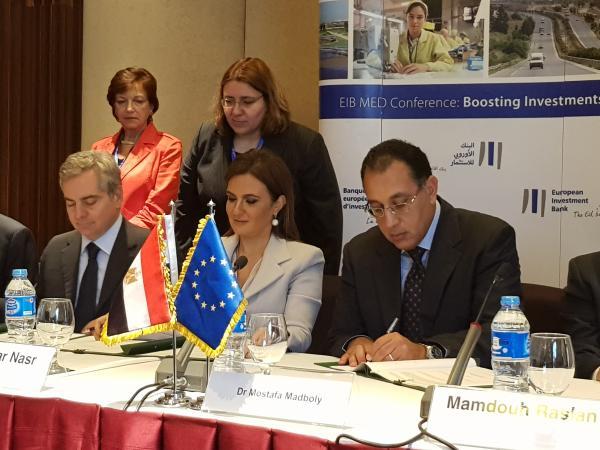
The drive for jobs and growth in the Mediterranean region should be led by the private sector. This was the call today, as the European Investment Bank (EIB) held an international conference in Cairo dedicated to “Boosting investments in the Mediterranean region”, in partnership with the Ministry of International Cooperation and Investment, the European Union Delegation to Egypt and the Union for the Mediterranean (UfM). The conference participants discussed regional challenges and opportunities in the context of the Bank’s recent efforts to mobilise finance to build economic resilience in the Mediterranean countries and offer new opportunities, particularly for young people and women under its new Economic Resilience Initiative.
The EU bank provided finance of EUR 1070.6 million in 2016 to support private sector development in the southern Mediterranean region. The finance targeted micro, small, medium-sized and large enterprises.
Government officials, investors, bankers, and researchers from Egypt, Jordan, Lebanon, Morocco and Tunisia discussed the current economic context and potential drivers of economic growth in the region, ways to help SMEs and micro entrepreneurs to access finance, and the critical investment needs to promote innovation and the international competitiveness of local firms.
“We believe the role that the private sector plays in boosting economic activity and creating jobs for the unemployed and new entrants to the labour market is absolutely key. This is why the EIB is stepping up its support to the private sector under its Economic Resilience Initiative. We recently approved EUR 600 million for SME finance in Egypt, Jordan, Lebanon, Tunisia and Morocco under the new initiative. Now we are looking at more good projects to support”, said Dario Scannapieco, Vice-President of the EIB.
Ambassador Ivan Surkoš, Head of the European Union Delegation to Egypt said, "Economic development is a critically important challenge, and to bring benefits it has to be sustainable, inclusive and guarantee decent job opportunities for all, especially young people and women."
"In this process, the private sector plays a crucial role. Supporting SMEs and the private sector in Egypt and the Mediterranean region will continue to be at the heart of the EU’s cooperation," he added.
Ambassador Surkoš pointed out that the EU is expected to mobilise more than EUR 1.2 billion in new financing for MSMEs in the region through the “EU Initiative for Financial Inclusion” during the period 2016-2020. He indicated that this will be done by pooling resources between the European Commission Neighbourhood Investment Facility (NIF) and European Finance Institutions.
Furthermore, the Head of the EU Delegation announced the new initiative called the European External Investment Plan (EIP), which will cover the MENA region, aimed at leveraging public and private funds from the EU and its Member States. The initiative will also reinforce the efforts to improve the business and investment climate. About EUR 44 billion is expected to be mobilised from 2017 until 2020.
The EIB conference comes as the EU bank rolls out its new Economic Resilience Initiative (ERI), which is fully complementary with the European External Investment Plan. The Economic Resilience Initiative for the Southern Neighbourhood and Western Balkans involves a step change in EIB support for these regions, helping economies to absorb and respond to crises and shocks, such as the Syrian refugee crisis, while maintaining growth. By stimulating investment in the private sector and vital infrastructure, it aims to create opportunities for employment and improve both daily living conditions and the business environment by increasing the provision of services like energy, transport, water, sanitation and education. Alongside increased financing, the EIB is set to offer additional concessional finance, enhanced support to the private sector and technical assistance during the 2016-2020 period.
This initiative is progressing – so far 13 projects representing financing of some EUR 1 billion have been approved since its launch in late 2016 until mid-2017. Private sector development accounts for well over half of approved financing. Lending via partner banks alone is set to benefit over 600 smaller businesses and midcaps, helping to sustain more than 40 000 jobs.
In 2016, the EIB provided EUR 1.6 billion in the Mediterranean region, of which 60% went to private sector finance.
Press contact:
Khaled Elnimr, +352437970482, k.elnimr@eib.org

Photographer: Khaled Elnimr ©EIB
Download original

Photographer: Khaled Elnimr ©EIB
Download original

Photographer: Khaled Elnimr ©EIB
Download original

Photographer: Khaled Elnimr ©EIB
Download original